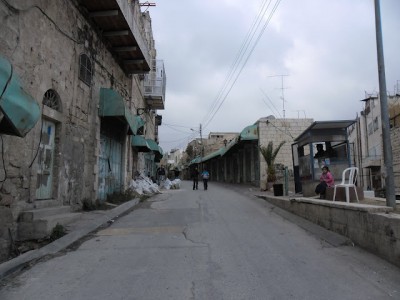5th June 2014 | International Solidarity Movement | Hebron, Occupied Palestine
My plan for the morning was pretty simple, I wanted to enter the souq (market) and buy some bread for breakfast, and then walk home. That was it. As I made my way towards the souq entrance I was stopped by two Israeli border police officers and asked for my religion. This is not an unusual experience in this city, the military are a common sight and as well as the regular checkpoints, they can and often do stop you at any time, demanding your identification, asking your religion, and any other questions they desire to ask.
I am neither ashamed nor proud of my religion. It is part of who I am in the same way my hair colour is a part of me. It is also a question I have been asked before and, as in the past, I told the truth.
“I’m Jewish,” I said.
The two border police officers spoke to each other in Hebrew, a language I have very little understanding of.
“Where are you going?” They asked.
“The souq,” I said. “I just want to go to the market.”
“No, you can’t go in. No Jews allowed.”
I wasn’t completely shocked, this has also been something stated to me before.
“Come on, I’ve been in there a thousand times, is it illegal for me to enter?”
“You can’t go in, you’re Jewish, it’s not allowed, it’s dangerous.”
I wanted to laugh, I may well have done. “It’s not dangerous, I have many friends in there, just let me go.”
This continued on for a few more minutes, the blood heating in my face as I tried to argue my case to no avail. The real irony was instead of walking through the market to go home, I was forced to walk Shuhada street, a perfect example of the apartheid that exists within this military occupation, a street where Palestinians have been barred from walking since the year 2000, where many people lost their homes and livelihoods after they were forced to leave and never return. Only the Israeli military, settlers, and internationals are allowed to walk Shuhada Street, it is often christened “Ghost Town” by the Palestinians, and indeed the sight of so many closed shops and houses, is haunting. It is also a street where I have been assaulted twice by settlers, so the idea that this was a safer alternative for me than the market, is laughable.
I have been fortunate enough to live in Palestine for several months, mainly living in the city of al-Khalil (Hebron). Al-Khalil is a city with many problems, mostly due to the illegal settlement in the heart of the city [all settlements in occupied territory are illegal under international law], and the huge Israeli military presence there to enable the settlers.
The Israeli military commits terrible crimes against the Palestinian people. I have seen them arresting and detaining adults and children for no reason, physically and verbally harassing the people of the city, using their military weapons against adults, youths and children, as well as a hundred and one other injustices that impact the daily lives of Palestinians in al-Khalil.
The settlers in al-Khalil are above the law. They attack Palestinians and steal their land and property on a regular basis. The Israeli military not only does nothing to stop this, but in many cases they condone and encourage it. I have seen settler youth throwing stones at Palestinian homes, while Israeli soldiers watched on. When we asked the soldiers to do something to stop this, they replied they would do nothing, as they are “children”. However Israeli soldiers have no qualms in using violence against Palestinian children. I have come to al-Khalil as a solidarity activist; one of the activities I participate in almost daily is ‘school checkpoint watch’. This is where I would assist in monitoring a specific checkpoint the children of the city are forced to go through on their way to school. I have witnessed Israeli soldiers harassing and searching children as they go through the checkpoint, firing tear gas and stun grenades at them and into their schools, and detaining children, some as young as six-years-old.
After the two border police officers denied me entry into the market in the morning, I tried again several hours later. The result was the same. I was angry, and I was upset, and while I am in Palestine as a solidarity activist, all I wanted to do was to go through the souq and visit one of my friends.
However, I have no intention of writing that I now “understand” what the Palestinians experience due to the military occupation, and the complete control that exists over their freedom of movement. My experience today was frustrating, and also unfair, but it is nothing compared to what the Palestinian people experience on a regular basis.
Due to the colour of my skin, and my nationality, I am incredibly aware of the privilege I have in Palestine, and all over the world. The very fact that I am able to enter Palestine is a huge privilege within itself; so many Palestinians in the diaspora were forced away from their homeland and have never seen it again. The fact that, if I so wish, I can travel to Yaffa, and one of my closest friends, a Palestinian woman whose family is originally from the city, can never see her home.
I have never been denied entry to any area due to my religion by Palestinians, or any other time in my life. It is telling that the first time this happens is by the Israeli military, under the façade of my ‘safety’. Unless Israeli soldiers or settlers enter, which they frequently do, the most dangerous thing that could happen to me in the souq is that I could overdose on tea, forced on me by my friends.

